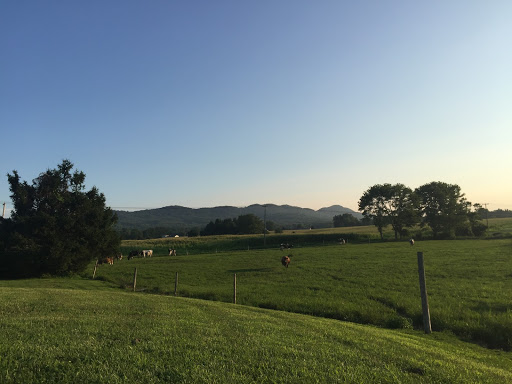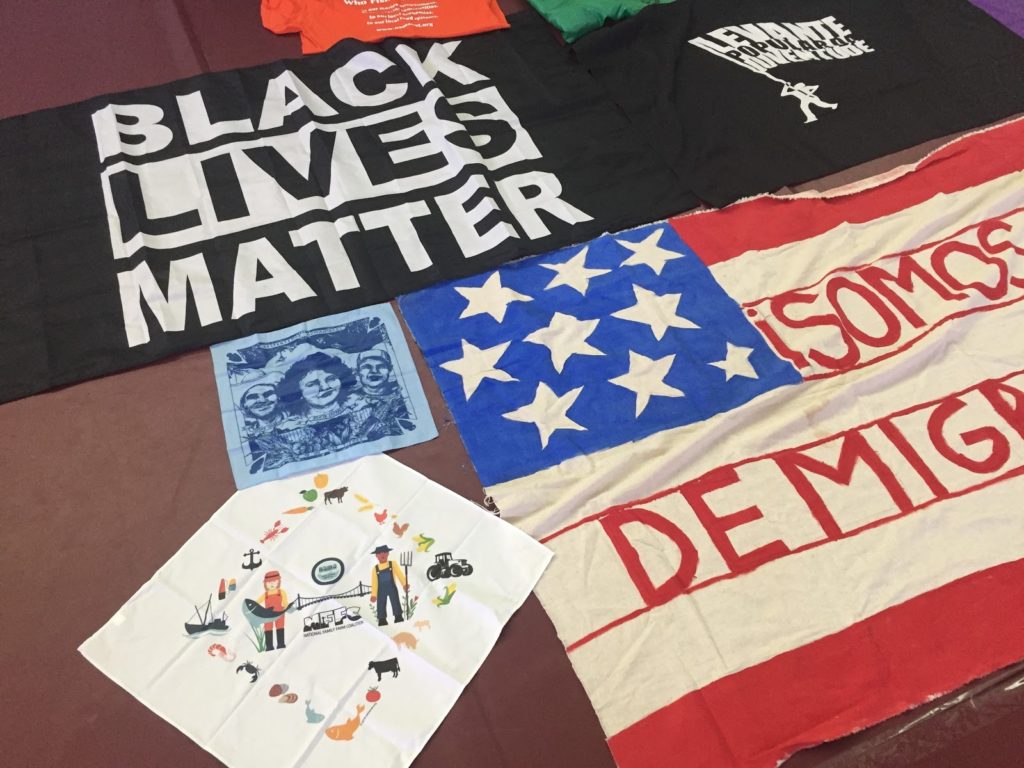
Building Power: Advancing a People’s Agenda for Food Sovereignty & Climate Justice at the US Food Sovereignty Alliance’s Northeast Regional Assembly
by Jamie Pottern, Land, Community, & Education Director at Agrarian Trust
Food Sovereignty: On the Road to Power
What does an equitable food system look like in world that values corporate profits over people, health, and the environment? What would a grassroots movement of people look like—a movement large enough to fight those interests and win? What does it look like for a national food movement to “build power”? How do we build a “common platform” across differences?
These are just some of the larger questions that arose at the US Food Sovereignty Alliance (USFSA)’s Northeast Regional Assembly at Hampshire College in Amherst, Massachusetts on August 9th and 10th, as the organizers geared up for the fourth USFSA National Assembly in Bellingham, Washington that will take place from October 12th to 15th, 2018.
Agrarian Trust was among 45 stakeholders from across the northeast—USFSA members and allies—who participated in the 2-day gathering. The stakeholders—most representing different grassroots organizations—shared their commitment and focus on elevating the basic rights and agency of the most marginalized in our local food movements (and across the globe): farm workers, food chain workers, fisher people, people of color, women, youth, and indigenous people.
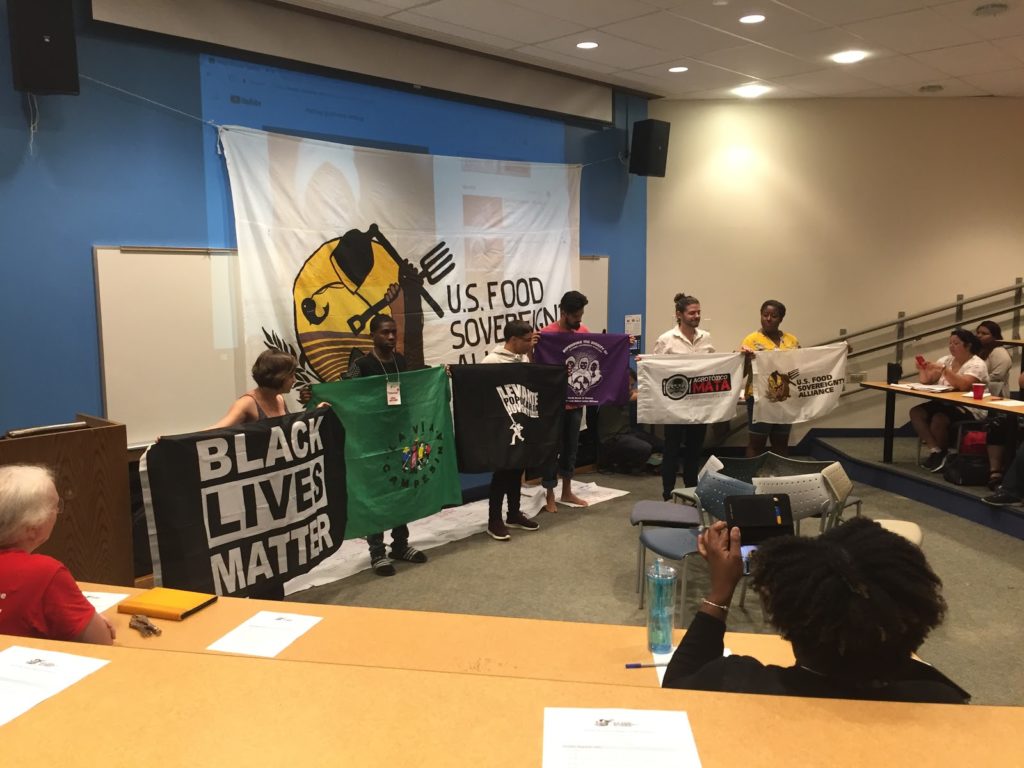
The US Food Sovereignty Alliance (USFSA) is a “US-based alliance of food justice, anti-hunger, labor, environmental, faith-based, and food producer groups” that “works to end poverty, rebuild local food economies, and assert democratic control over the food system.” Born out of dialogue with the global small farmers and farm workers movement, La Via Campesina and the International Planning Committee of Food Sovereignty (IPC), USFSA is a network of leaders in the U.S. working to build solidarity, strengthen the political power of farmers and food organizations, and connect “local and national struggles to the international movement for food sovereignty.” As described by the event’s organizers, it is “a global process inside of the United States.” (Learn more details about the history and structure of USFSA here!).
Food sovereignty—a term coined by La Via Campesina in 1996 and solidified in the Declaration of Nyéléni in Mali in 2007—is defined as “the right of peoples to healthy and culturally appropriate food produced through ecologically sound and sustainable methods, and their right to define their own food and agricultural systems.”
A Political Education
For many of us here in the U.S. involved in the movement to build resilient local and regional food systems, we’ve heard the call to action or seen the bumper sticker to “Think Globally, Act Locally.” For so much of our work, building connections in our local communities is the most powerful way to affect local change. Based in the northeast, I’ve felt strongly that we simply can’t change the big, global international and political system designed to crush us, but we can organize in our own communities or regions by conserving land, addressing environmental and social issues, passing ordinances, electing forward-thinking officials, and buying from our local farmers and fisherpeople. Here in the northeast we have been trendsetters and leaders in policy-making, developing organic farming standards, conserving farmland, pioneering farm education programs, and so many other initiatives.
But in this interconnected, global, industrialized food system, there’s a false sense of safety in pure localism and regionalism. Many of us end up fighting over the same finite resources (I’ll discuss this more below) and sometimes fighting with each other, when we could be in greater allyship and solidarity toward common aims. And as emphasized by Saulo Araujo from Why Hunger, unless we build a “common platform” and “political power” in alliance with one another, the big machine will continue to crush us. We have to heed the call from our social movement organizers in the Global South to advance our own political education here in the U.S. We have to work together to set local, regional, and national priorities and to join the global conversation around food sovereignty, if we’re going to have any chance of moving the needle.
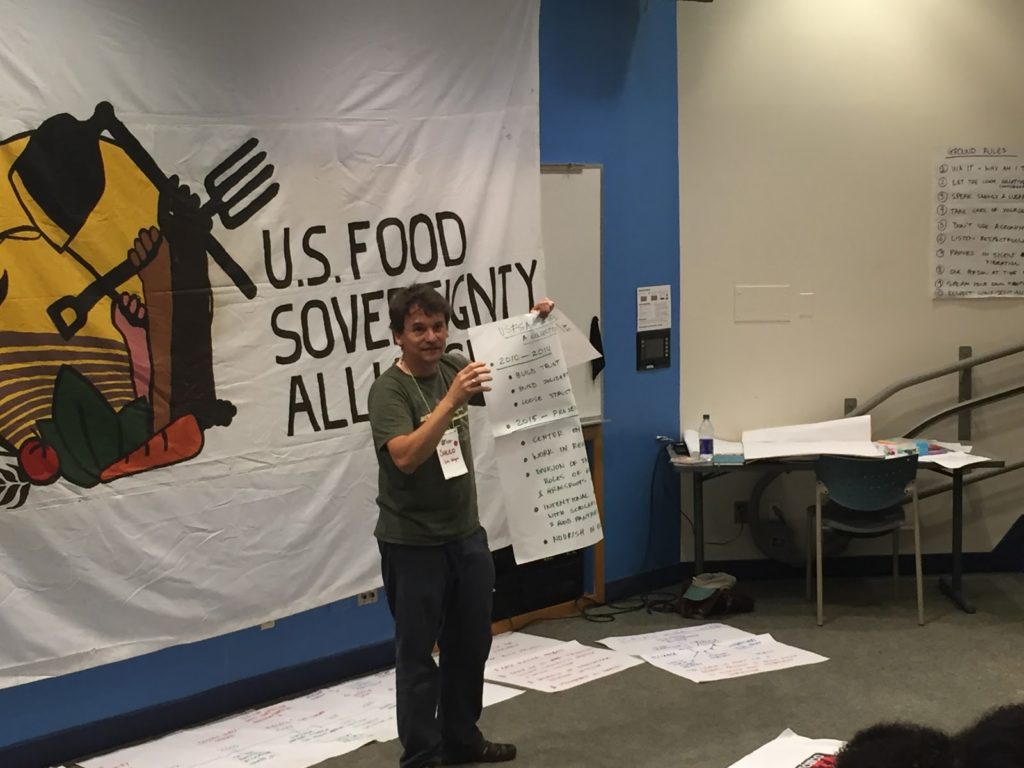
Building A Common Platform—Building Power
The movement towards greater food sovereignty requires us to struggle together in an effort to build political power to advocate for collective interests. This was evident as the close of the 2-day assembly neared and we grasped for how to prioritize collective needs; both across our disparate northeast region and across such deep divides of race, class, indigenous land theft, inequity, language, wealth, access, and understanding.
We brainstormed a wide array of needs for achieving greater food sovereignty in the northeast:
NARRATIVE CHANGE • TRAINING & EDUCATION • REMAKING & RECLAIMING • POLICY CHANGE & LEGAL PROTECTIONS OF RESOURCES • LOCAL FOOD & SOLIDARITY ECONOMY WORK • SHARING RESOURCES & LAND • ORGANIZING PROCESSES & SPACES • EMPOWERING NEW LEADERSHIP • HEALING SPACES • REPARATIONS • AGROECOLOGY • EQUITABLE ACCESS • NEW FORMS OF GOVERNANCE & DECISION-MAKING
Given these great needs: What is an effective process of organizing across difference for a common agenda? None of us can win by ourselves. According to Saulo, it’s about showing up, it’s about relationship-building and trust, it’s about being in dialogue together and developing a shared analysis and process. The Alliance does not replace the “base organizing” but helps to build “a common platform and power.” Therefore, representation and commitment from all stakeholders is needed.
The term “building power” calls to mind the image of the dozens of small fish drawn in the shape of a large fish, which is in the process of eating a big fish. On their own, each small fish would get eaten by the big fish; together they can fight back. It’s the Global South organizers, like La Via Campesina’s international peasant movement—the largest movement of small farmers in the world—that we have the most to learn from about organizing effective social movements.
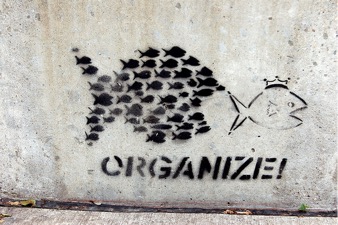
The Non-Profit Industrial Complex
The USFSA is deliberately not organized with a “non-profit” legal structure—it is an Alliance: an umbrella group of its members, which now has 4 regional chapters: the Midwest, the Southeast, the Northeast, and the Pacific Northwest. The goal is to build a national agenda and a common platform.
Among the reasons they are not organized as a non-profit is the “non-profit industrial complex”—cited as an unintended consequence of non-profits in a capitalistic society. This is where mission-driven organizations can end up altering their structure or focus (due to competition, funder priorities, or other pressures) at the expense of the mission. The USFSA operates on an extremely lean budget and the tireless efforts of volunteers. The Alliance structure seeks to democratize the movement, while calling upon grassroots support organizations to join and actively participate in this critical dialogue and sharing “ways of knowing.”
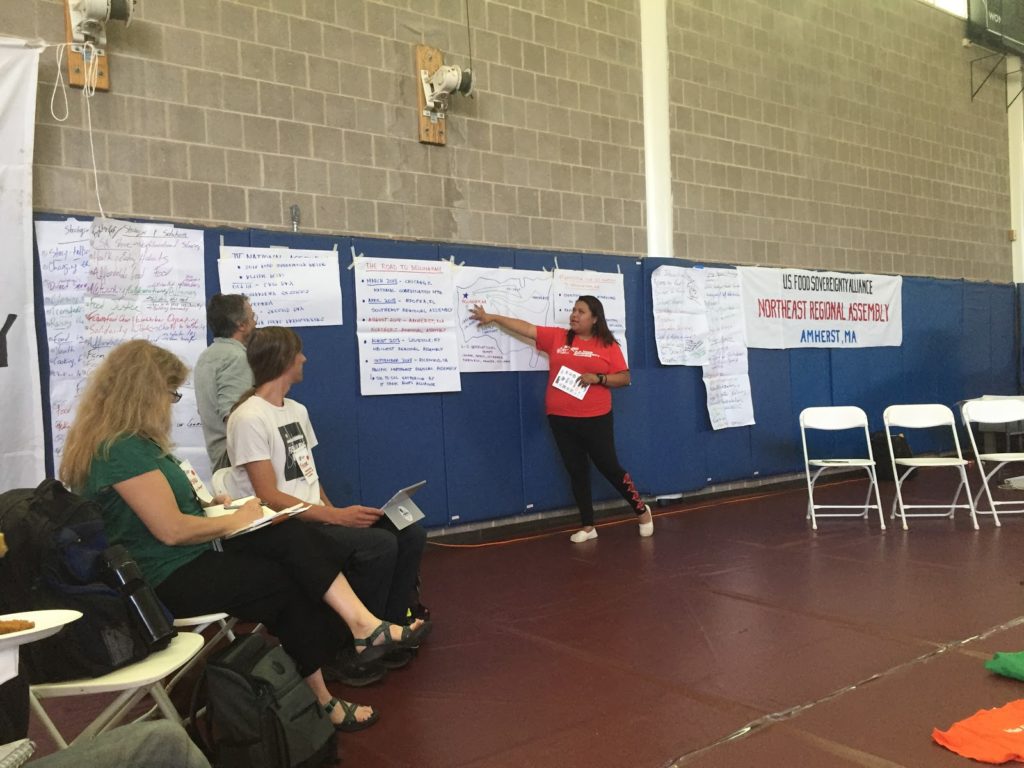
The Path Ahead
A few weeks after the Regional Assembly, I’m sitting here writing this reflection at a small food cooperative in my small town in Massachusetts. The store is bustling with shoppers. The shelves are bursting with local produce, but also with products of all shapes and sizes from far away across the country or the globe; grown by farmers, processed and transported by food chain workers, affected by policies both inside and outside of our political discourse. My love of our local food movement is unyielding: But there is also a myth of localism that keeps us separated from each other and from our common cause.
There are no easy answers, but there is so much we can all learn and contribute. On behalf of Agrarian Trust, I was honored to participate in this the Assembly and learn about opportunities and challenges to create greater food sovereignty in the northeast and across the country. We look forward to continued involvement with the inspiring organizers at USFSA—particularly around questions of agrarian land reform and land access—and lending support to their cause. As a national organization, Agrarian Trust is committed to aligning with and connecting with both local communities and national movements. Through holding farmland in common, we are working toward greater and more equitable land access, healthy land and communities, and greater food sovereignty for all.
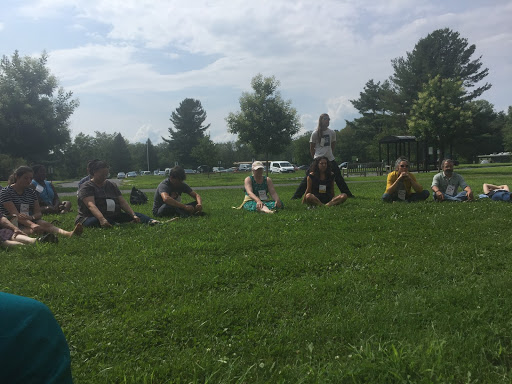
How you can help USFSA:
- Donate to their organization
- Apply to become a Member of USFSA:
- Invite others with resources/knowledge to apply to be a member or participate
- Join a Planning Committee of USFSA
- Attend the National Assembly in Bellingham, WA from Oct 12-15 and help build a common platform and greater power for our cause.
- Sponsor someone to attend the National Assembly.
- Show up!—lend your voice, resources, know-how
- Focus on a “political education” for yourself and your organization about your role in the national and international movement towards greater food sovereignty.
Read USFSA’s Call to Action for more.
